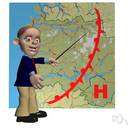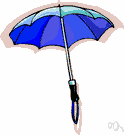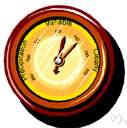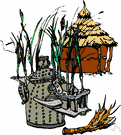weather
(redirected from weatherer)Also found in: Thesaurus, Medical, Encyclopedia.
weather
weath·er
(wĕth′ər)weather
(ˈwɛðə)weath•er
(ˈwɛð ər)n.
weath·er
(wĕth′ər)Weather
2. meteorology. — aerologist, n. — aerologic, aerological, adj.
2. Humorous weather forecasting.
2. the condition of being bedewed.
Weather
See Also: CLOUD(S), COLDNESS, ENTRANCES/EXITS, FOG, HEAT, MIST, RAIN, SUN, THUNDER AND LIGHTNING, WIND
- The chilly, drizzly June day smelled like a basement —Marge Piercy
- The elements are but as qualities that change forever, like all things that have known generation —Dame Edith Sitwell
- Frost made the sunny air seem like a bright keen knife —Howard Spring
- Humidity … dropped down over the city like a damp serge cloak —Carlos Baker
- The humidity … slapped me in the face like a mugger’s glove —Loren D. Estleman
- Rain and thaw took its [snow’s] place, and now the world looks about as pleasing as a wet cat —John Wainwright
- The storm crashes like god-wars —Hayden Carruth
- The [hot] weather clings, like a low fever you cannot shake off —Angela Carter
- Weather … cool and gray as wash water —George Garrett
- Weather in towns is like a skylark in a counting-house, out of place and in the way —Jerome K. Jerome
- The weather was like a waiter with a tray —Wallace Stevens
- The whine of wind and rattle of rain and the thunder rolling terribly loud and near overhead like a thousand beer trucks roaring over the bridge —John Dos Passos
Weather
dog days The most oppressively hot, uncomfortable, and unhealthy time of the year; the height of summer, usually calculated to be from about July 3 to August 11. These are supposedly the days when Sirius, the Dog Star, rises at the same time as the sun. The name dog days (Latin dies caniculares) derives from the ancient belief that the customary sultriness and un-wholesomeness of this season were due to the influence of the Dog Star. The origin of the name has also long been associated with the popular superstition that during this particular time of the year dogs were most apt to go mad. The term has been in use since the early 16th century.
gully washer A very heavy rainstorm, a downpour. This American colloquialism, particularly common in the Texas-Oklahoma area, was obviously coined because of the swirling rush of water through gullies during such storms. An especially violent gully washer is sometimes jocularly called a gully whomper. The expression has been figuratively extended to include a great onrush or outpouring of anything.
The drouth of senatorial candidates in Johnston county will be broken with a “gulley washer” here this week. (The Capital-Democrat [Tishomingo, Okla.], June, 1948)
halcyon days See PEACE.
Hulda is making her bed An expression denoting a snowfall. In ancient German mythology Hulda is the goddess of marriage and fertility. Although this expression is of unknown origin, it is reasonable to conjecture that Hulda had a feather bed which she prepared for the delights of newlyweds and from which some plumes periodically escaped to fall to the earth as snow.
Indian summer A brief respite in the late autumn of North America, characterized by hazy, balmy weather. This expression is thought to have originated in New England, where the Indians took advantage of the unseasonably warm spell to make their final winter preparations. The term is used frequently in the northern United States and Canada, where this short reappearance of summer regularly occurs each fall.
Meanwhile the Indian summer continued warm and dusty on the trodden earth of the farmyard. (J. Rae, Custard Boys, 1960)
Like other terms denoting time of year or day, Indian summer is often analogously applied to one’s life, indicating a period of renewed vigor or health amidst a stage of general decline.
The works of his Indian Summer when, in the last five years of his life, inspiration came to him once more. (N. Del Mar, Richard Strauss, 1962)
Mother Carey is plucking her chickens Sailors’ slang for falling snow. In this expression, Mother Carey is derived from the Latin mater cara ‘mother dear,’ apparently a reference to the Virgin Mary. Mother Carey’s chickens is a sailor’s appellation for stormy petrels, friendly birds which warn sea voyagers of upcoming inclement weather. Thus, the expression likens fluffy, falling snow to small tufts of white feathers.
Queen’s weather Ideal weather conditions; magnificent weather occurring on a day set aside for a festival, picnic, or other outdoor activity. This expression originated from the disproportionate number of fine days which coincided with Queen Victoria’s public appearances.
Although the wind is rather high, Queen’s weather prevails. (Johannesburg Star, April, 1899)
rain cats and dogs To pour, to come down in torrents, to teem. This common but puzzling expression has appeared in the writing of such varied authors as Swift, Shelley, and Thackeray. The most repeated explanation relates it to the storm god Odin, often pictured with cat and dog who according to Norse mythology influenced the weather. More plausible but equally un-definitive is the theory suggesting a derivation from an obsolete French word catadoupe ‘waterfall,’ itself related to an actual waterfall of the Nile in Ethiopia.
rain pitchforks To rain hard and piercingly; to rain straight downwards, so that the rainfall appears discernible as separate streaks of water. This primarily U.S. colloquial expression, probably coined by New England farmers, sees infrequent usage today, perhaps because the implement conveying the image is no longer part of most people’s immediate experience.
I’ll be even with you, if it rains pitchforks—tines downwards. (David Humphreys, The Yankey in England, 1815)
three-dog night A bitterly cold night. This expression is derived from the Eskimos, who purportedly measure the cold by determining how many dogs are necessary to keep them warm during the night. Thus, a night which requires the warmth of three dogs is a frigid night indeed. Even though the temperatures in the temperate climate of the United States do not plunge nearly as low as they do in polar regions, the expression has nonetheless become a popular American colloquialism for the coldest winter nights.
weather-breeder A day of unseasonably or otherwise exceptionally magnificent weather, formerly thought to be a harbinger of an approaching storm; a daylong respite in a period of inclement weather. This expression originated in England, where the weather is predominately dank and overcast. It can thus be assumed that, since such fine days were almost invariably followed by foul weather, the English folk saw a weather-breeder as a bad omen.
Look at a very fair day, as that which may prove a weather-breeder, and usher in a storm. (John Arrowsmith, A Chain of Principles, 1659)
weather
– whetherIf you are talking about the weather, you are saying, for example, that it is raining, cloudy, sunny, hot, or cold.
Be Careful!
Weather is an uncountable noun. Don't use 'a' with it. Don't say, for example, 'We are expecting a bad weather'. Say 'We are expecting bad weather'.
Don't tell someone what the weather is like by saying, for example, 'It's lovely weather'. Say 'The weather is lovely'.
Do not confuse weather with whether. You use whether when you are talking about two or more alternatives.
weather
Past participle: weathered
Gerund: weathering
| Imperative |
|---|
| weather |
| weather |
| Noun | 1. |  weather - the atmospheric conditions that comprise the state of the atmosphere in terms of temperature and wind and clouds and precipitation; "they were hoping for good weather"; "every day we have weather conditions and yesterday was no exception"; "the conditions were too rainy for playing in the snow" weather - the atmospheric conditions that comprise the state of the atmosphere in terms of temperature and wind and clouds and precipitation; "they were hoping for good weather"; "every day we have weather conditions and yesterday was no exception"; "the conditions were too rainy for playing in the snow"meteorology - the earth science dealing with phenomena of the atmosphere (especially weather) atmospheric phenomenon - a physical phenomenon associated with the atmosphere cold weather - a period of unusually cold weather hot weather - a period of unusually high temperatures thaw, thawing, warming - warm weather following a freeze; snow and ice melt; "they welcomed the spring thaw" downfall, precipitation - the falling to earth of any form of water (rain or snow or hail or sleet or mist) wave - a persistent and widespread unusual weather condition (especially of unusual temperatures); "a heat wave" elements - violent or severe weather (viewed as caused by the action of the four elements); "they felt the full fury of the elements" air current, current of air, wind - air moving (sometimes with considerable force) from an area of high pressure to an area of low pressure; "trees bent under the fierce winds"; "when there is no wind, row"; "the radioactivity was being swept upwards by the air current and out into the atmosphere" atmospheric state, atmosphere - the weather or climate at some place; "the atmosphere was thick with fog" good weather - weather suitable for outdoor activities |
| Verb | 1. |  weather - face and withstand with courage; "She braved the elements" weather - face and withstand with courage; "She braved the elements" |
| 2. | weather - cause to slope | |
| 3. |  weather - sail to the windward of weather - sail to the windward of sail - travel on water propelled by wind; "I love sailing, especially on the open sea"; "the ship sails on" | |
| 4. |  weather - change under the action or influence of the weather; "A weathered old hut" weather - change under the action or influence of the weather; "A weathered old hut" | |
| Adj. | 1. |  weather - towards the side exposed to wind weather - towards the side exposed to wind windward - on the side exposed to the wind; "the windward islands" |
weather
withstand yield to, surrender to, give in to, succumb to
"Summer has set in with its usual severity" [Samuel Taylor Coleridge]
"'Tis the hard grey weather"
"Breeds hard English men" [Charles Kingsley The Three Fishers]
"weather: the climate of an hour" [Ambrose Bierce The Devil's Dictionary]
"Red sky at night, shepherd's delight; red sky in the morning, shepherd's warning"
Weather
| Phenomenon measured | |
|---|---|
| anemometer | wind velocity |
| anemoscope | wind direction |
| atmometer | rate of water evaporation into atmosphere |
| barograph | atmospheric pressure |
| barometer | atmospheric pressure |
| baroscope | atmospheric pressure |
| hygrometer | humidity |
| maximum-minimum thermometer | temperature variation |
| nephoscope | cloud velocity, altitude, and direction of movement |
| psychrometer | humidity |
| rain gauge | rainfall and snowfall |
| rawinsonde | atmospheric wind velocity |
| Stevenson's screen | temperature |
| sunshine recorder | hours of sunshine |
| thermometer | temperature |
| weathercock | wind direction |
| weather vane | wind direction |
| wet-and-dry-bulb thermometer | humidity |
| wind gauge | wind velocity |
| wind tee | wind direction |
weather
verbweather
[ˈweðəʳ]weather permitting → si el tiempo lo permite, si el tiempo no lo impide
in this weather → con el tiempo que hace, con este tiempo
it's very comfortable to wear in hot weather → es muy cómodo de llevar (puesto) cuando hace calor
what's the weather like? → ¿qué tiempo hace?
he has to go out in all weathers → tiene que salir haga el tiempo que haga
it gets left outside in all weathers → se deja siempre a la intemperie
to keep a weather eye on sth → observar algo con atención
to make heavy weather of sth → complicar algo, hacer algo más difícil de lo que es
he only needed to change the bulb but he made such heavy weather of it → ¡sólo tenía que cambiar la bombilla pero lo complicó de una manera!
to be under the weather (= ill) → estar indispuesto, estar pachucho
we've weathered worse criticism than this → hemos superado peores críticas que éstas, hemos hecho frente a peores críticas que éstas
to weather the storm → capear el temporal
the rocks had been weathered into fantastic shapes → las rocas tenían formas fantásticas debido a la erosión
weather conditions NPL → estado m del tiempo
weather forecast N → pronóstico m del tiempo, boletín m meteorológico
weather forecaster N → meteorólogo/a m/f
weather girl N → mujer f del tiempo, meteoróloga f
weather report N → boletín m meteorológico
weather ship N → barco m del servicio meteorológico
weather side N (Naut) → costado m de barlovento
weather strip N → burlete m
weather vane N → veleta f
weather
[ˈwɛðər]what's the weather like? → quel temps fait-il?
What was the weather like? → Quel temps faisait-il?
the weather was
The weather was lovely → Il a fait un temps magnifique.
The weather was good for the time of year → Il faisait beau pour cette période de l'année.
weather
weather
:weather
:weather
:weather
[ˈwɛðəʳ]in this weather → con questo tempo
what's the weather like? → che tempo fa?
it gets left outside in all weathers → rimane fuori con qualsiasi tempo
to be under the weather (fig) (ill) → sentirsi poco bene
to make heavy weather of sth → far sembrare qc più difficile di quello che sia
weather
(ˈweθə) nounwhether is a conjunction: Do you know whether he is coming?
weather
→ طَقْس počasí vejr Wetter καιρός tiempo sää temps vrijeme tempo 天気 날씨 weer vær pogoda tempo погода väder อากาศ hava thời tiết 天气weather
| Weather |